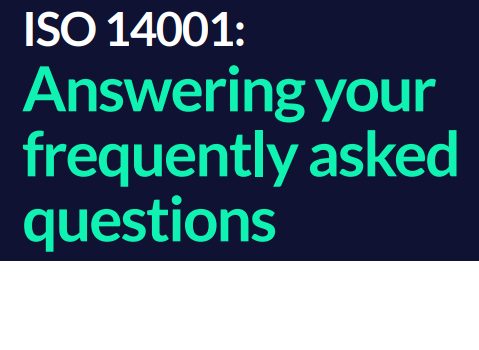
ISO 14001 FAQs
Discover how ISO 14001 certification supports environmental performance and compliance goals for your organisation.
Whether you're considering certification or looking to enhance your existing system, this ISO 14001 FAQ guide addresses the most common questions to support your sustainability journey.
What is ISO 14001?
ISO 14001 specifies the requirements for an environmental management system that organisations can use to improve environmental performance. It supports pollution prevention, legal compliance, and continual improvement across business operations by embedding environmental management into strategic decision-making.
What are the benefits of ISO 14001?
ISO 14001 certification offers several practical advantages that go beyond environmental responsibility:
- Compliance with environmental legislation: It provides a structured framework to identify and address current and upcoming environmental regulations.
- Better environmental risk management: Helps reduce energy usage, manage waste, boost recycling, and lower raw material costs—minimising reactive clean-up costs or litigation.
- Increased business credibility: Independent certification enhances your reputation and can give you a competitive edge during tenders or contract bids.
- Stronger risk management: Demonstrates your commitment to managing environmental risks while showing progress toward defined sustainability goals.
- Operational cost savings: Continuous improvement in resource efficiency can drive down costs over time.
Why is ISO 14001 important?
ISO 14001 reflects the evolving needs of businesses operating in today’s complex and environmentally sensitive world. It enables organisations to proactively enhance environmental performance and embed sustainable practices into long-term strategies—positioning them as responsible, resilient, and forward-looking entities.
How do I get ISO 14001 certified?
LRQA provides end-to-end support to help you achieve ISO 14001 certification. From accredited certification services and tailored training programmes to detailed gap analysis, we help ensure you meet the international standard's requirements.
With our expert auditors and proven industry knowledge, we explore your specific environmental challenges with precision and offer insights that enhance your system’s effectiveness.
Can ISO 14001 be integrated with other management systems?
Yes. ISO 14001:2015 follows the Annex SL high-level structure, making it fully compatible with other modern ISO management system standards such as:
- ISO 9001 – Quality Management Systems
- ISO 45001 – Occupational Health & Safety
- ISO 27001 – Information Security
This enables streamlined implementation and integration for organisations looking to build a unified management system framework.
When will ISO 14001 be updated?
The most recent version of ISO 14001 was published in 2015. In 2021, the ISO committee initiated a public survey to determine if a revision was needed. A decision on future updates was scheduled for discussion in the committee’s December 2022 plenary session.
ISO 14001 Revision: Everything You Need to Know
The International Organization for Standardization (ISO) has registered a draft update for ISO 14001, the globally recognised environmental management systems standard. Although not yet final, the update is undergoing a 12-week ballot as part of the formal Draft International Standard (DIS) process. If consensus is achieved, a revised standard is expected to be published in January 2026.
What’s changing in the draft?
The proposed revisions aim to improve clarity, consistency, and alignment with other ISO standards. Key updates include:
- Alignment with ISO’s harmonised structure for management systems
- Improved clarity through reworded requirements and additional guidance
- Expanded Annex A notes and definitions
- Specific emphasis on climate change in Clause 4.1
- New notes in Clause 4.2 to clarify “interested parties”
- Additional life cycle perspective guidance in Clause 6.1.2
- New Clause 6.3 on change management planning
- Revised Clause 8.1 on operational control of outsourced processes
- Reorganised management review (Clause 9.3)
- Removal of Clause 10.1 to simplify the improvement section
Please note: These changes are still in draft form and may be updated further following the ballot outcome.
When will the new standard be published?
The final ISO 14001:2026 standard is expected in January 2026. Transition guidance will follow, with the typical transition period for ISO management systems expected to be up to three years—though this may be shorter due to the scope of changes. More clarity is anticipated by spring 2025.
Read more about the ISO 14001 revision and how LRQA can support you
Why choose LRQA for ISO 14001?
With decades of experience in certification, inspection, training, and risk assurance, LRQA helps organisations across sectors implement ISO 14001 with confidence. We combine analytical rigour with a client-first approach—delivering value through independent certification and strategic insights tailored to your environmental goals.
Our expertise extends beyond certification to include:
- Accredited EMS audits
- Gap assessments and readiness reviews
- Custom training courses for internal teams
- Ongoing performance evaluation and improvement guidance
Looking for a downloadable version?
Access our full FAQ guide to explore these questions and more in detail, and take the next step in your environmental management journey.
